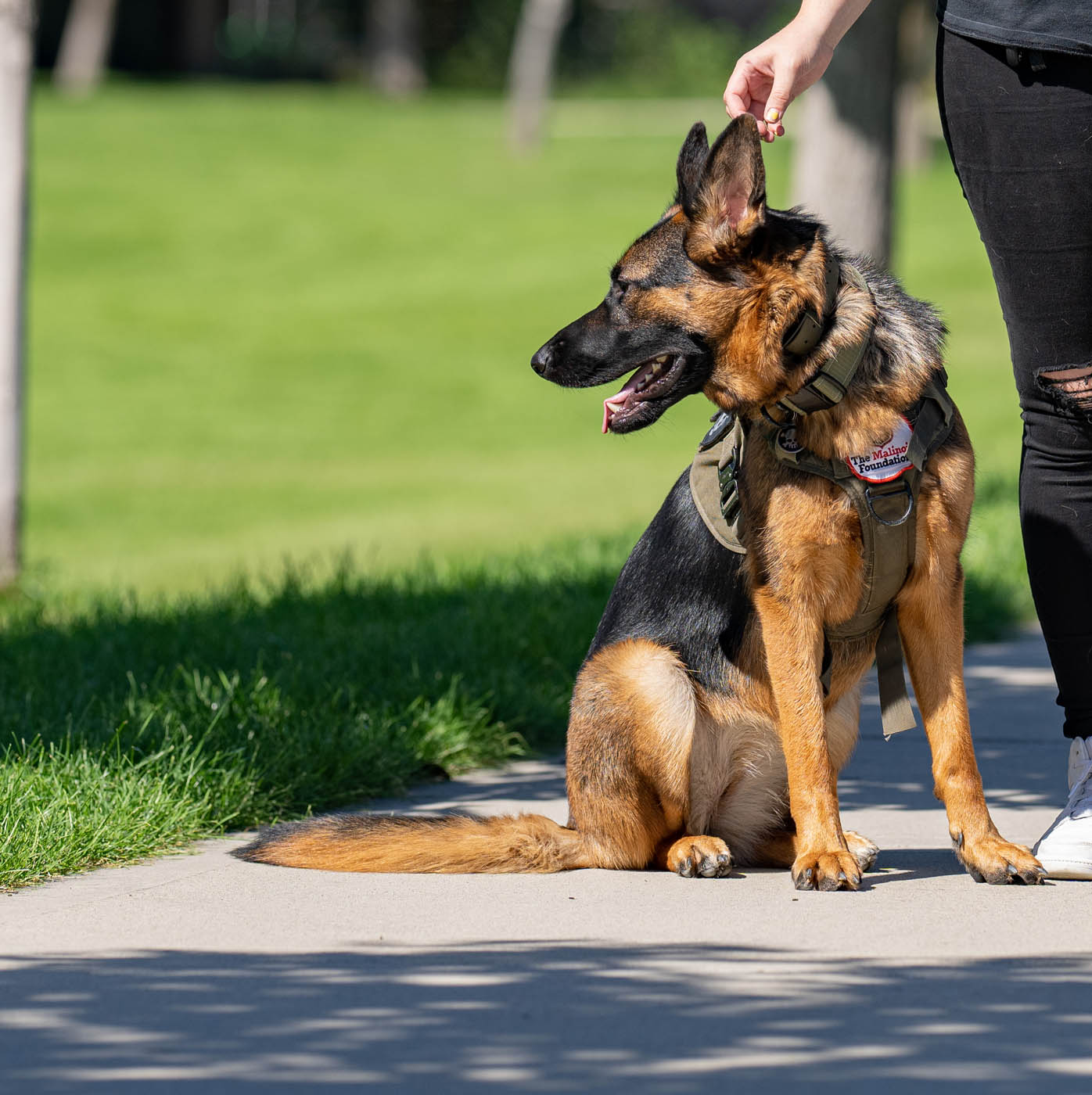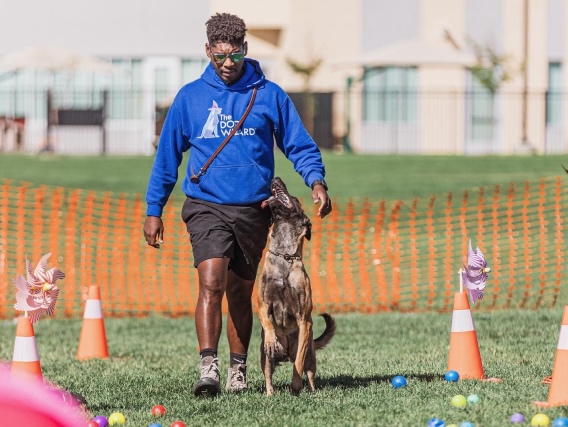Discovering Options for Dog Training Charlotte: What You Need to Know
Discovering Options for Dog Training Charlotte: What You Need to Know
Blog Article
Unlock Your Dog's Potential: Proven Pet Dog Training Techniques for Success
Efficient canine training is a nuanced process that depends upon recognizing canine actions and employing clinically backed methods. dog training near me. By including favorable reinforcement, developing clear commands, and prioritizing socializing, pet dog proprietors can grow an effective connection with their pets. Obstacles frequently emerge that need tailored solutions and a patient approach. Discovering these verified techniques exposes not only the possibility for behavior enhancement but additionally the much deeper bond that can be developed between proprietor and pet dog. What vital techniques must be considered to absolutely open your dog's possibility?
Understanding Pet Dog Behavior
Recognizing canine actions is vital for reliable training and promoting a favorable relationship in between dogs and their proprietors. A comprehensive understanding of canine body movement, vocalizations, and social communications is essential for identifying their feelings and needs. Pet dogs communicate mainly via non-verbal cues; for instance, a wagging tail may indicate excitement, while pinned ears can indicate concern or entry.

In addition, ecological aspects play a considerable function in shaping a canine's behavior. Changes in regular, brand-new surroundings, or the presence of unfamiliar people can bring about anxiety or stress and anxiety in canines. Recognizing these triggers enables proprietors to alleviate damaging reactions and create proper training methods.
Ultimately, a deep understanding of dog actions lays the structure for successful training approaches, enhancing both behavior and the total bond in between the dog and its owner. Dog training. This expertise is vital for promoting a well-adjusted, happy canine friend
Positive Support Methods
Reliable training depends heavily on favorable reinforcement strategies, which have been revealed to yield substantial results in forming preferred actions in canines. This strategy includes compensating a pet dog for exhibiting certain behaviors, consequently increasing the probability that these behaviors will be duplicated. Rewards can take numerous forms, including deals with, praise, toys, or play, depending on what inspires the specific canine.

It is important to gradually terminate benefits as the canine learns the actions, transitioning to periodic reinforcement. This approach preserves the behavior with time while stopping reliance on consistent benefits. By focusing on favorable reinforcement, instructors can cultivate a trusting connection with their canines, advertising a cooperative and healthy and balanced training atmosphere that enhances general obedience and performance.
Developing Consistent Commands
An essential aspect of effective dog training is the facility of consistent commands. Uniformity in commands is important for reliable communication in between the pet and the trainer. When commands are consistent, dogs discover to link particular words with wanted behaviors, which speeds up the training procedure and enhances understanding.
To develop regular commands, it is vital that all household members utilize the very same terminology and gestures. As an example, if a single person uses "rest" while an additional says "take a seat," it can develop complication for the dog. Select clear, distinctive words for commands and ensure everyone included in the pet dog's training sticks to these choices.
Reinforce commands through constant method, guaranteeing that the dog receives sufficient possibilities to respond properly. When a pet dog effectively complies with a command, instant positive reinforcement should follow.
Lastly, hold your horses. Establishing consistent commands requires time and initiative. With dedication and quality, you will certainly aid your pet develop a strong understanding of expectations, eventually bring about a well-behaved buddy.
Socializing and Exposure
Socializing a dog is essential for fostering a well-adjusted and certain buddy. This process includes exposing your dog to a range of atmospheres, people, and other pets to create their social abilities and versatility. Early socialization, ideally in between the ages of three to fourteen weeks, is essential, as it lays the foundation for a pet dog's future actions.
During socializing, purpose to why not check here supply favorable experiences in different settings, such as parks, busy roads, and homes with other family pets. Introduce your pet to different stimulations, including audios, views, and smells, making sure that each encounter is gratifying. This exposure helps alleviate concern and stress and anxiety, leading the way for an extra resilient pet dog.
Involving in controlled group play sessions with other canines can likewise improve social abilities, educating your pet appropriate interactions and boundaries. Prioritizing socialization will considerably contribute to your pet dog's general joy and actions throughout their life.
Conquering Common Educating Challenges

An additional frequent concern is interruption. Pets may battle to focus in unknown or active settings. Progressively desensitize your dog to diversions by starting training in a peaceful setting and slowly presenting even more stimuli as they end up being competent (dog training charlotte). Positive support strategies, such as treats and praise, can keep inspiration and focus.
Additionally, behavioral problems like leaping or too much barking can come to be frustrating. Address these by instructing alternate habits, such as resting steadly when welcoming visitors. Uniformity and perseverance are essential; reinforce preferred habits regularly and prevent scolding, which can cause complication.
Finally, acknowledge that each pet dog is special, and training timelines might differ. Tailor your technique to your pet dog's private requirements, and seek professional assistance if required. With perseverance and the right techniques, overcoming these challenges can lead to a trained, satisfied canine friend.
Final Thought
To conclude, unlocking a dog's potential demands a thorough technique that integrates an understanding of canine behavior, the application of favorable support methods, and the establishment of regular commands. Early socializing and exposure to varied settings additionally enhance a dog's flexibility and confidence. By addressing usual training difficulties with tailored approaches and persistence, a cooperative and unified connection between pet and handler can be cultivated, eventually resulting in a mannerly companion with the ability of flourishing in various circumstances.
Effective pet training is a nuanced process that pivots on understanding canine actions and employing medically backed techniques.Recognizing canine actions is vital for reliable training and site here promoting a favorable relationship in between dogs and their proprietors.Reliable training relies greatly on positive reinforcement strategies, which have been shown to generate significant outcomes in forming wanted habits in pets. When commands are uniform, canines find out to associate certain words with wanted behaviors, which speeds up the training procedure and boosts understanding.
In conclusion, opening a pet's potential necessitates a thorough technique that integrates an understanding of canine actions, the application of positive reinforcement techniques, and the establishment of consistent commands.
Report this page